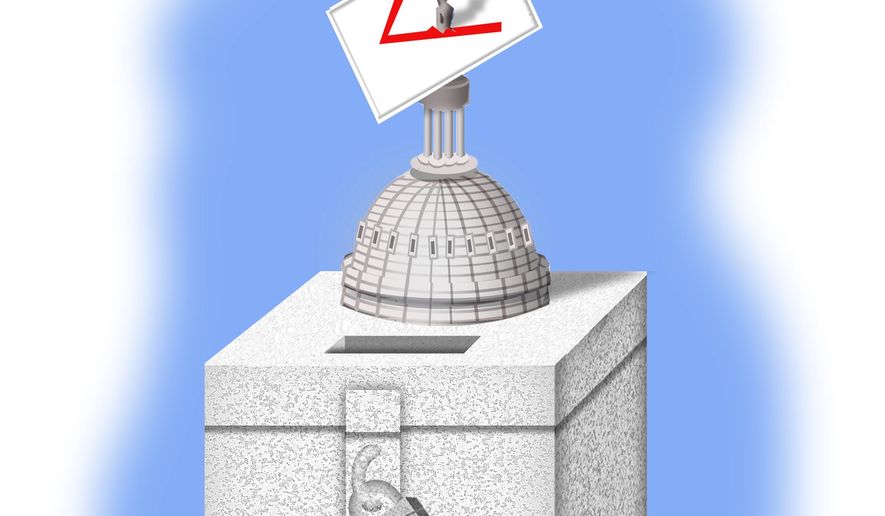OPINION:
With President Biden’s approval rating in a nosedive, the Biden administration is rightfully worried about the upcoming elections in 2022 and 2024. Recognizing their impending doom, 31 Democrat House members have announced that they won’t even bother running for reelection.
But the Biden administration doesn’t plan to go quietly. Instead, they’re working feverishly from multiple angles to keep themselves in power and are advancing a nefarious plan to do so. Fortunately for states, there is a strategy they can employ to stop this federal overreach and protect their elections.
But first, the plan: Last March, an executive order, EO 14019, tasked federal agencies with providing a strategic plan for registering and mobilizing voters using federal resources, including offices located in states across the country. Those strategic plans, per the EO, were placed directly into the hands of Susan Rice, the president’s Domestic Policy Advisor, back in September. Now, with election takeover legislation permanently stalled in Congress, the Biden administration has shifted its attention to this failsafe plan to federalize elections.
So far, one of the administration’s key strategies for exerting control over state elections has been the weaponization of the newly politicized Civil Rights Division of the Department of Justice, now led by Mr. Biden’s political appointees. Under the direction of these new appointees, DOJ has filed meritless lawsuits in Texas and Georgia attacking their election laws. They have issued a wave of new official guidance reinterpreting laws that have been on the books for decades in ways that benefit the left. This guidance is designed to coerce or otherwise manipulate states into abandoning lawful election integrity reforms they have passed, which might place commonsense guardrails on voting practices that tend to invite cheating and overwhelmingly benefit Democrats.
The latest guidance, published earlier this month, centers on ballot drop boxes. It claims to “help election officials understand” how the requirements in the Americans with Disabilities Act of 1990, and subsequent guidance that came out more than a decade ago, now apply to ballot drop boxes. The false impression it gives is that any reforms that make ballot drop boxes more secure are likely illegal, hoping to discourage the passage or enforcement of new laws designed to secure drop boxes. Meanwhile, other recent DOJ guidance addresses voting by mail and post-election audits, giving the same impression to local officials. Any effort to make it harder to cheat is likely to face legal challenges from DOJ.
As a result of this guidance, many state election laws designed to protect elections could come under threat. This includes state laws that set reasonable methods for securing ballot drop boxes, such as requiring they be placed inside secure locations and monitored —whenever they are accessible to the public — to help prevent tampering, destruction or fraud. Commonsense reforms such as those that criminalize ballot harvesters who prey upon vulnerable voters, including the elderly and people with disabilities, could also come under threat because of this guidance.
Given the likelihood that this guidance, and the additional guidance that will inevitably follow, may mislead, intimidate or confuse honest election officials and lead them to ignore state election law, states must act.
One way states can respond is by passing a law that would require the state legislature to examine any new federal election guidance or communication related to that guidance coming from the Biden administration to ensure it is accurate and lawful before the state’s election officials implement it.
This would allow states to seek clarity on any new guidance before it is blindly followed, challenge inaccurate or unlawful guidance in court if necessary, or push back in other ways. It would also protect local election officials from inadvertently violating state law or being bullied by the Biden administration to knowingly do so.
Imagine a scenario where, less than a month before the midterm election, DOJ suddenly issues new official guidance warning the state’s election officials that following certain key rules passed by their state legislature would violate federal law and expose them to civil and criminal liability. With only a month before the election and no mechanism in state law to compel the officials to follow the state rule, many election officials will simply ignore the state rule and comply with the federal guidance. By the time the governor and the legislature get wind of this new guidance document and mobilize an effort to stop it, it will be too late. Pointing out then that the guidance was never legally binding or that the state rule they ignored has already been upheld by the courts as perfectly legal won’t matter because the election will already be over.
This scenario can be avoided by enacting legislation requiring election officials to secure the legislature’s approval before blindly following any new guidance.
The primary responsibility for deciding the time, place and manner of elections falls squarely on the shoulders of state legislatures, with a limited role for Congress. The president has no authority to craft election law through executive order or guidance documents created by his unelected political appointees. Dressing the guidance to look like the law does not make it law. States must recognize this and refuse to allow the Biden administration to take their constitutional power from them. Passing a law like the one described above is one way to do that.
Election integrity laws are under threat, but states can fight back. For the sake of democracy, they must.
• Tarren Bragdon is the CEO of the Foundation for Government Accountability. Stewart Whitson is a senior fellow at the Foundation for Government Accountability.




Please read our comment policy before commenting.